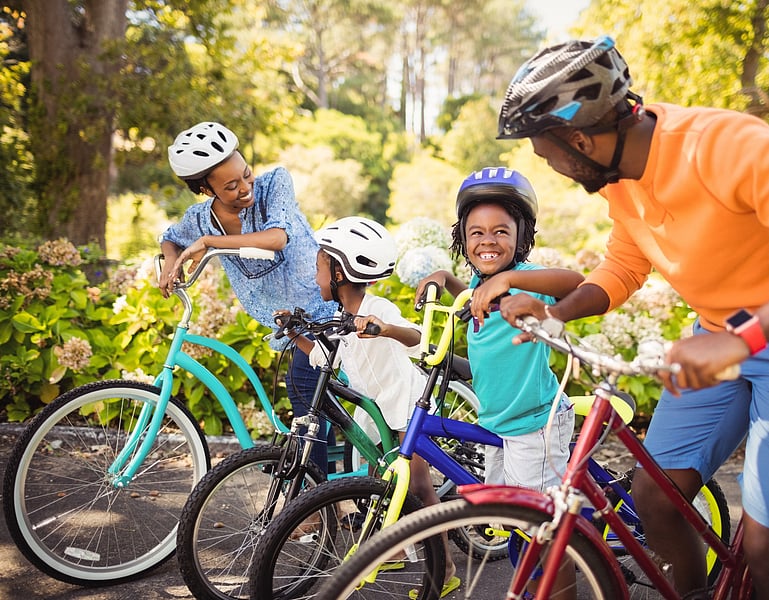Get Healthy!

- Cara Murez
- Posted March 19, 2023
Gear Up (Helmets Included) for a Safe Bike Season
As the weather warms, folks are bringing out their bicycles for a ride.
That's great, but it's important to be ready for a safe biking season: The national rate of bike accidents is two fatal crashes and 2,630 accidents requiring emergency room visits every week.
Angela Mountz, community car seat safety program coordinator at Penn State Health Children's Hospital in Hershey, offers some tips for parents to help their young cyclists avoid serious childhood riding accidents.
"I had a cousin who was hit by a car [while on a bike],"Mountz said in a hospital news release.
Mountz's cousin didn't die, but suffered from the injuries for the rest of his life.
"Kids go around thinking, 'It's not going to happen to me,'"she said. "But it's so important to protect yourself."
A helmet is at the very top of her list. The odds that a child will suffer a serious injury if involved in a crash while biking go up 40% if they're not wearing a helmet, Mountz said.
Parents should also wear a helmet while riding: "We need to teach them by example,"Mountz said.
Aim for safety over style, Mountz added. Look for a sticker from the American National Standards Institute or the Snell Memorial Foundation to be sure your child's helmet is certified.
Check your kids' helmets every two months to make sure they're still fitting properly.
A helmet should fit snugly, not so tight that it cuts off the circulation but it shouldn't move much.
Have your child open their mouth. Do they feel the helmet hugging their head? If not, try tightening it.
The rim of the helmet should be two finger widths above the eyebrows.
The chin strap should fit over the chin and be buckled while in use. Make sure the straps form a V under the ears.
Kids riding scooters or skateboards should also wear helmets.
The next consideration is the bike itself. Make sure it's a good fit, even if it's a hand-me-down.
Have you child stand next to it. Are their hips even with the seat? When they aren't pedaling, their feet should easily be able to reach the ground.
Check the bike's tires and brakes. Is the chain loose? Are there any loose parts? If the bike is too big or in disrepair, consider replacing it instead of reusing it.
When riding, choose good shoes. That means sneakers rather than flip flops. Make sure your child isn't wearing loose-fitting clothing that can get caught in the bike chain.
It's OK to wear other protective gear, as long as it doesn't make it harder to ride.
Talk to your older kids about the rules of the road. Motorists must allow 4 feet of distance when overtaking a bicycle, but bicyclers must follow traffic laws. They should signal if they're turning, stop at crosswalks and yield to pedestrians. Cyclists must ride with traffic, not against it.
More information
The U.S. National Highway Traffic Safety Administration has more on bicycle safety.
SOURCE: Penn State Health, news release, March 15, 2023







